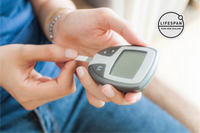
Introducing Dahlia4: Natural Blood Glucose Support
Developed by Otago University, Dahlia4 is a groundbreaking natural supplement for managing blood glucose levels. Combining the best of nature and science, it offers a safe and effective way to support your health.
Why Dahlia4?
Natural Ingredients: Carefully selected for their synergistic effects on blood glucose.
Scientifically Proven: Rigorously tested for efficacy and safety.
Holistic Health: Aids in overall well-being when used alongside a balanced diet and exercise.
Dahlia4 is more than a supplement; it's a step towards a healthier, more balanced life. Experience the natural way to manage your blood glucose with Dahlia4.
Recent posts

About the Author
Lifespan NZ, bolstered by over 60 years of experience, features a team of experts including Ben Winters, a key member and the author of our insightful blogs. Specialising in refining extracts from a diverse range of natural sources and well-versed in farming practices, our team's expertise was a pivotal reason why Otago University chose Lifespan NZ to develop a unique, research-backed blood sugar supplement, into an end product.

Tips to Lower Blood Sugar Naturally
By Ben Winters
We are all looking to be healthy. Regardless of whether we are young, middle aged, or older, we all want to live our best life, and to do this we need good health.
However poor lifestyle choices, stressful working environments, and busy day to day lives can make it harder to stay healthy.
In the quest for better health, managing blood sugar levels is an important consideration.
Maintaining the right balance can significantly reduce the risk of diabetes, obesity, and other metabolic syndromes. While medication is essential for those who need it, various natural strategies can help stabilise blood sugar levels.
Here are six tips to help you lower your blood sugar naturally.
1. Control Carb Intake: Carbohydrates are the primary source of energy, readily broken down into glucose that supplies the body with fuel. However, understanding the type and amount of carbohydrates you consume is essential.
Refined carbs and sugars can cause rapid glucose spikes, whereas complex carbs provide a steadier energy source.
Managing your carb intake can prevent these drastic fluctuations in blood sugar levels.
One effective strategy is adopting a low-glycemic diet, incorporating foods that cause a gradual increase in blood sugar.
Examples include legumes, whole grains, fruits, nuts, seeds, and non-starchy vegetables. These foods contribute to slower digestion and absorption of nutrients, providing a sustained release of energy without the sudden peaks in blood glucose.
Fiber intake is particularly crucial, as it moderates how your body digests and releases glucose, keeping blood sugar levels more stable.
Pay attention to portion sizes, perhaps by using measuring tools or visual cues, to avoid overeating carbs inadvertently.
Additionally, understanding and applying the concept of carbohydrate counting, often used in managing diabetes, can be beneficial.
This practice involves calculating the number of carbs in a meal and matching that to your insulin doses if you're on insulin therapy.
2. Get Regular Exercise: Physical activity is a universal booster for health, offering countless benefits, one of which is lowering blood sugar levels.
Regular exercise increases insulin sensitivity, meaning your body requires less insulin to transport sugar to your cells. This mechanism directly influences blood glucose control, especially for individuals with type 2 diabetes.
While all forms of exercise can contribute, a combination of aerobic and resistance training might be particularly beneficial.
Aerobic exercises help your body use insulin better by enabling muscle glucose uptake, improving heart health, and increasing energy levels. Activities can range from brisk walking and running to swimming and cycling.
Resistance training, like weightlifting, enhances muscle mass.
Since muscle tissue burns more glucose than fat does, building muscle mass can lead to more glucose being used, lowering levels in the blood. It's essential to find a balanced routine, suited to your personal preferences and physical condition, that integrates both forms of exercise.
Remember, consistency is key, and any physical activity is better than none.
3. Stay Hydrated: Drinking adequate water throughout the day is a cornerstone of health, influencing both physical and cognitive functioning. Hydration's role in blood sugar control is less obvious but equally significant.
Regular water intake maintains your blood volume and concentration, helping to prevent dehydration.
When you're dehydrated, the vasopressin hormone signals your liver to produce more blood sugar and prevents your kidneys from excreting it, leading to higher blood sugar levels.
Water, unlike various sugary beverages, does not have a direct impact on your glucose levels.
By choosing water as your primary beverage, you avoid sudden increases in blood sugar. Moreover, staying hydrated supports your kidneys in filtering your blood and excreting any excess glucose through urine.
Aiming for the recommended daily water intake — generally 3.7 liters for men and 2.7 liters for women from all beverages and foods — can contribute to steady blood sugar levels.
However, these needs can vary based on factors like age, sex, pregnancy, health conditions, and physical activity levels.
4. Manage Stress Levels: Stress is a natural physical and mental reaction to life experiences, but chronic stress has extensive negative effects on health, including blood sugar levels.
When you're stressed, your body enters the so-called 'fight or flight' mode, which triggers the release of various hormones like cortisol and glucagon.
These hormones cause your liver to release more glucose, providing energy for an immediate response.
However, if you're frequently stressed and your insulin isn't working well, this mechanism could lead to consistently high blood sugar levels.
Managing stress becomes an essential component of managing blood sugar.
Several techniques can help, including mindfulness meditation, yoga, deep breathing exercises, or guided relaxation.
These practices can lower stress hormones and lead to a more balanced emotional state, reducing blood sugar spikes associated with stress.
Regular physical activity, adequate sleep, healthy eating, and social connections also play a role in stress reduction.
Professional help, such as therapy or counseling, can be valuable for chronic stress or anxiety that impacts daily functioning.
5. Prioritize Sleep: Quality sleep isn’t a luxury; it’s a necessity for good health. While we sleep, our body goes to work repairing cells and regulating hormones, including insulin.
Sleep deprivation has been linked to poor blood sugar control and insulin resistance, largely because it disrupts the balance and function of key hormones.
Inadequate sleep affects the body's hunger-regulating hormones, leading to increased appetite and calorie intake, and potentially, weight gain. Over time, sleep deprivation can contribute to the development of type 2 diabetes.
To improve sleep quality, establish a regular sleep schedule, going to bed and waking up at the same time each day to regulate your body's internal clock.
Create a restful environment, minimizing potential disturbances such as noise, light, and electronic devices. Additionally, lifestyle habits like avoiding caffeine and heavy meals close to bedtime, managing stress, and using relaxation techniques can promote better sleep.
6. Incorporate Foods with a Low Glycemic Index: The glycemic index (GI) is a valuable tool for managing blood sugar levels, ranking foods based on their immediate impact on blood glucose. Low-GI foods cause a slow, steady rise in blood sugar, whereas high-GI foods cause quick, sharp spikes.
By choosing foods with a lower GI, you can minimize these abrupt peaks and troughs.
Incorporate plenty of non-starchy vegetables, whole grains, legumes, nuts, and seeds into your diet, as these typically have a low GI. Fruits, though often containing more sugars, can still be part of a low-GI diet — berries, cherries, and apples are good examples.
When preparing meals, pair carbohydrates with proteins and fats, which can slow the absorption of sugar during digestion.
For instance, if you’re having oatmeal (a higher GI food), adding flaxseed and nuts can balance out the meal, contributing to slower digestion and preventing a rapid spike in blood sugar.
Using the glycemic index requires a bit of research and planning, but it’s a scientifically supported method to help manage blood sugar levels through dietary choices.
Certainly, wrapping up such comprehensive insights on maintaining healthy blood sugar levels naturally, it's essential to underscore the interconnected nature of our lifestyle choices and their cumulative impact on our overall health.
In conclusion, managing blood sugar levels is not a stand-alone task, but a comprehensive approach that requires consistent, holistic changes to one's lifestyle.
It's not just about cutting sugar or avoiding certain types of food but about a more integrated approach to health.
Regular physical activity, proper hydration, stress management, quality sleep, and a balanced diet low in high-glycemic foods work in synergy to stabilise blood sugar levels.
These natural methods, backed by science, can contribute significantly to preventing the spikes and dips in blood sugar that can lead to long-term health issues, particularly for individuals at risk for or currently managing diabetes.
Adopting these strategies does require mindfulness and commitment, and the transition might seem challenging at first.
However, the long-term benefits for health, well-being, and quality of life are profound and far-reaching.
It’s always advisable to seek guidance from healthcare professionals when making significant lifestyle changes, particularly for individuals with existing health conditions or specific dietary needs.
Personalisation is key in health-related matters, ensuring that the changes made are not only effective but also sustainable and enjoyable, promoting a harmonious, healthier lifestyle.





